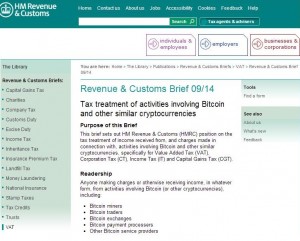All news » Accounting Treatment for Bitcoin transactions
Accounting Treatment for Bitcoin transactions
One of the best definition of money is ‘Money is what money does’. Bitcoin, a digital currency, is gradually making its mark as ‘money’ in our modern world. On 3rd Mar 2014, HMRC issued a brief 09/14 on the treatment of Bitcoin for tax purposes.
http://www.hmrc.gov.uk/briefs/vat/brief0914.htm
There seems to be temporary good news for Bitcoin miners and traders from VAT perspective as it is regarded outside the scope for now.
However, for all usual businesses Bitcoin is mainly acting as another currency. Taxes are as usual on actual goods and services traded whether currency is Bitcoin or pound sterling.
Here’s a useful extract from HMRC site:
‘’For businesses which accept payment for goods or services in Bitcoin there is no change to when revenue is recognised or how taxable profits are calculated.
- Corporation Tax: The profits or losses on exchange movements between currencies are taxable. For the tax treatment of virtual currencies, the general rules on foreign exchange and loan relationships apply. We have not at this stage identified any need to consider bespoke rules.
For companies, exchange movements are determined between the company’s functional currency (usually the currency in which the accounts are prepared) and the other currency in question. If there is an exchange rate between Bitcoin and the functional currency then this analysis applies. Therefore no special tax rules for Bitcoin transactions are required. The profits and losses of a company entering into transactions involving Bitcoin would be reflected in accounts and taxable under normal Corporation Tax rules. - Income Tax: The profits and losses of a non-incorporated business on Bitcoin transactions must be reflected in their accounts and will be taxable on normal income tax rules.
- Chargeable gains – Corporation Tax and Capital Gains Tax: If a profit or loss on a currency contract is not within trading profits or otherwise within the loan relationship rules, it would normally be taxable as a chargeable gain or allowable as a loss for Corporation Tax or Capital Gains Tax purposes. Gains and losses incurred on Bitcoin or other cryptocurrencies are chargeable or allowable for Capital Gains Tax if they accrue to an individual or, for Corporation Tax on chargeable gains if they accrue to a company.’’
If a traditional business has bought or sold goods and services using Bitcoin, the best accounting treatment for bitcoin transactions (for now) is similar to dealing in a different currency.
e.g. A UK web designer Mr A provides a service to a company in USA, agrees a price of say $1,000 USD and gets paid in equivalent Bitcoin, let’s say 1 Bitcoin. The receiver will need to have a digital Wallet to be able to receive 1 Bitcoin. In accounting system we can create a new Bank Account called ‘Bitcoin Account’ and since our accounting system is in GBP we record an equivalent GBP value when we record this payment.
Now there are two possible scenarios.
A) Our UK web designer decides to sell the Bitcoin next day for GBP. If he does that and is left with zero Bitcoin in his wallet and receives GBP in his bank account, we will record the transaction by transferring the amount in his bank account and any difference (loss/gain) of value can be recorded as FX gain/loss.
B) If the UK business does not convert the Bitcoin into GBP, then for reporting purpose they should use the Bitcoin value as at balance sheet date. Bitcoin price charts are available from indices like http://www.coindesk.com/price/
Finally, since nothing is certain in life. Here’s the last paragraph extracted from HMRC brief:
“Future implications
The tax treatments outlined in this brief are for tax purposes only. They in no way reflect on the treatment of cryptocurrencies for regulatory or other purposes.
Given the evolutionary nature of these cryptocurrencies, HMRC will issue further guidance as appropriate.
Issued 3 March 2014”
Get in touch to find out how we can help you
Tagged in: Uncategorized
